Reply To:
Name - Reply Comment
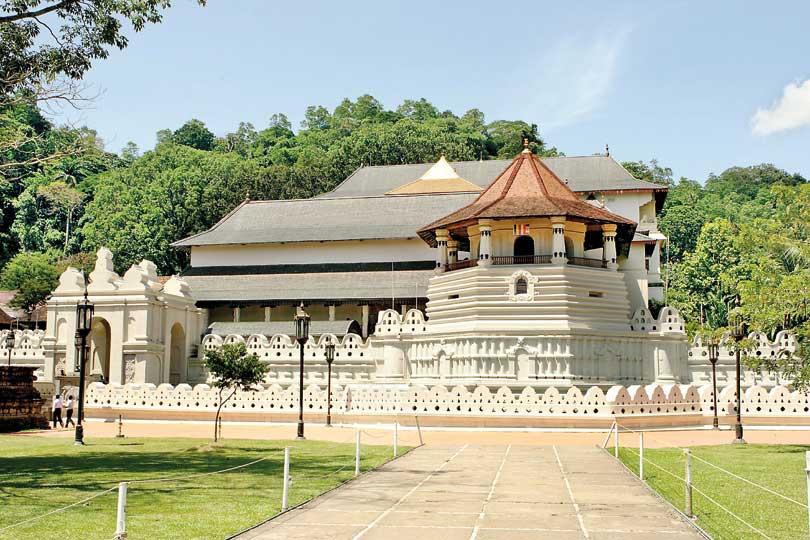
Much has been spoken of the Easter Sunday terror attacks and the network of National Tawheed Jamaat (NTJ) – the hitherto little known terrorist outfit responsible for the bombings in three churches and several deluxe hotels on April 21. Two days subsequent to the dastardly suicide bombings, Indian security agencies alerted Sri Lanka that another attack could be carried out by NTJ, the Hindustan Times reported quoting senior officers of the SITE intelligence group.
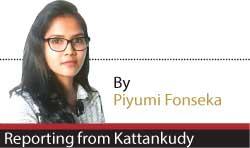 The NTJ that was formed in Kattankudy was predominantly led by the family members of Zahran. His brothers Zaini and Rilwan were prominent figures in the now proscribed terrorist outfit. A majority of NTJ members were in their twenties.
The NTJ that was formed in Kattankudy was predominantly led by the family members of Zahran. His brothers Zaini and Rilwan were prominent figures in the now proscribed terrorist outfit. A majority of NTJ members were in their twenties.
Following the February 2018 attack on Muslims in Digana, a group of Muslim youths from Mawanella joined Zahran.
Naufar Moulavi, one of Zahran’s teachers, was NTJ’s second in command. In February 2019, the faction linked to Naufar Moulavi protested saying Zahran favoured his relations. There was also a tug of war between Zahran and Naufar over NTJ leadership which split the outfit into two factions.
The second head of TJ Naufar Moulavi and his NTJ allies opined suicide bombings should be carried out at all nine provinces in the country simultaneously. This sketch contrasted with that of Zahran.
H.M. Ahmad Millan, who was in charge of NTJ’s armed wing, sided with Naufar Moulavi. Police say he was responsible for the killing of two constables at Vavuniya in 2018 – he was arrested in Saudi and extradited on June 14.
Zahran had appointed his brother Rilwan to organise the second spate of attacks. His other brother Zaini had been tasked with conducting extremist lectures and NTJ propaganda. The Zahrans have reportedly had several safe houses in Panadura, Negombo, Malwana and Kalmunai. They had also rented an apartment in Kollupitiya. Buying and renting of residences for the second spate of attacks had been entrusted to Mohammdu Niyas and Kalmunai Siyam. In early April, the duo had rented five safe houses in the East – one from Sainthamaruthu, one from Sennal Gramam, one from Adalachchanai and two from Nintavur. A warehouse in Sammanthurai had been rented to store explosives.
After the bombs were systematised for the Easter attacks, the remaining explosives had been dispatched from Negombo and Sammanthurai warehouses. Oblivious to the impending danger, the lorry driver had transported the explosives on April 9 from Negombo to Sammanthurai
According to reports, a monthly rental of Rs.40,000 had been paid for the house in Sainthamaruthu, while a monthly rental of Rs.50,000 was paid for the warehouse at Sennal Gramam in Sammanthurai. Meanwhile, one of the two houses in Nintavur was rented for Rs.20,000 per month. The house in Addalaichenai had been paid a monthly rental of Rs.15,000. Although the standard monthly rental for houses in these areas average Rs.3,000-5,000, the attackers had paid large sums to retain the abodes in Ampara.
On April 19, Zahran’s brothers Rilwan and Zaini along with several females attached to the group had purchased white clothes from a shop in Giriulla for Rs. 29,000. According to the police, the clothes were for the second and third attacks targeting Buddhist places of worship – SIS sources state the Temple of the Sacred Tooth Relic had been one of the main targets. Some others are Kaluwanchikudy Church and several mosques in Ampara. A total of 11 suicide bombers had been prepared for the next spate of attacks.
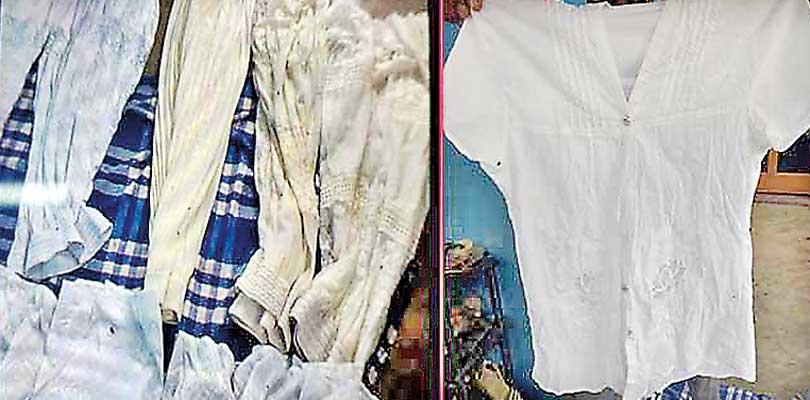
According to the police, the clothes were for the second and third attacks targeting Buddhist places of worship – SIS sources state the Temple of the Sacred Tooth Relic in Kandy had been one of the main targets. Some others are Kaluwanchikudy Church and several mosques in Ampara. A total of 11 suicide bombers had been prepared for the next spate of attacks.
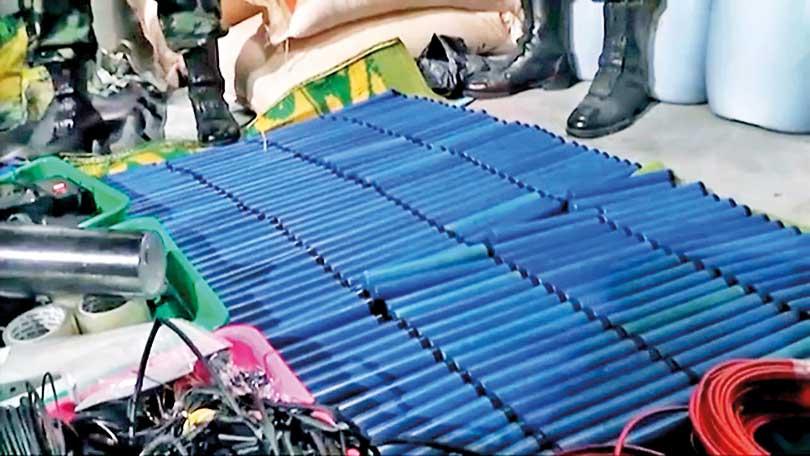
On April 26, the security forces seized a cache of explosives at Sammanthurai in the Eastern Province
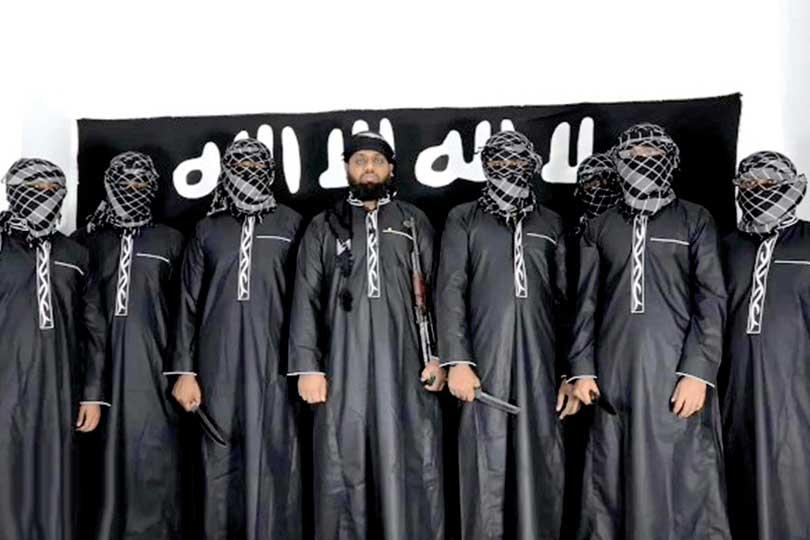
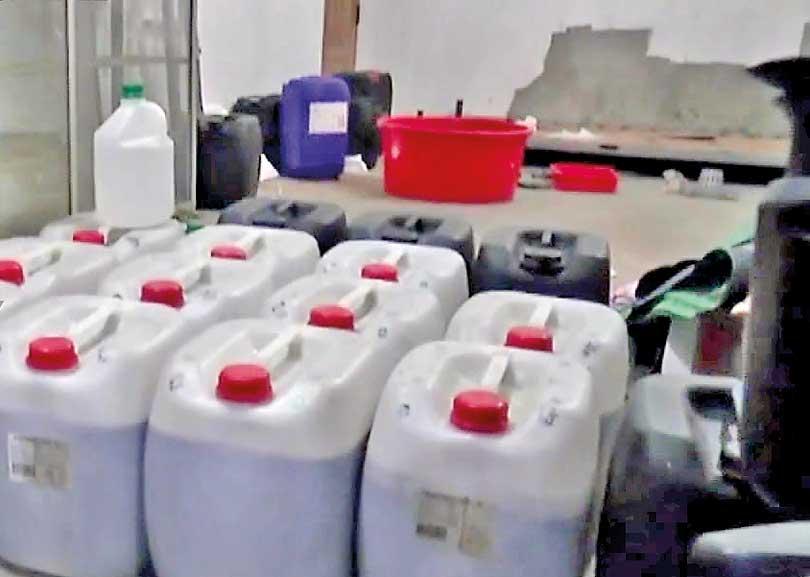
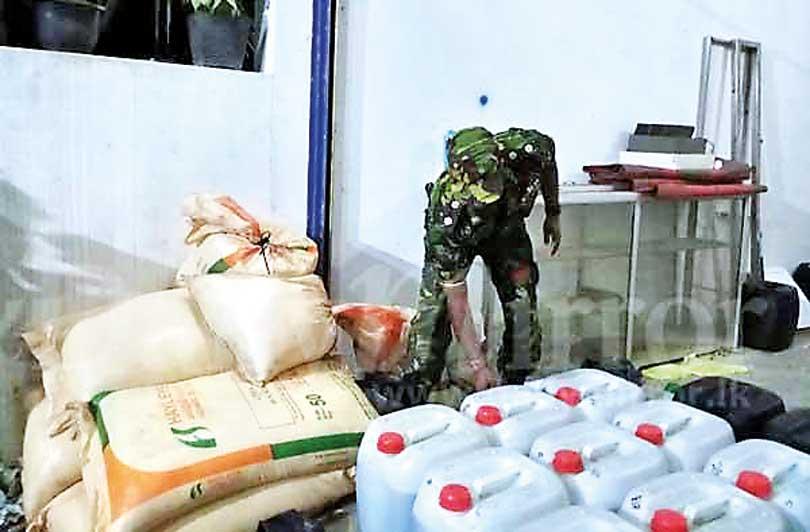
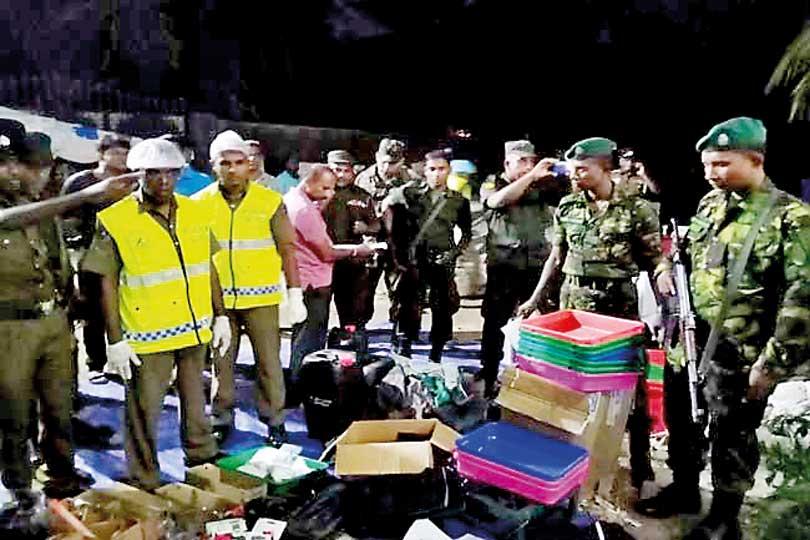
The cache of explosives seized by the security forces at Sammanthurai in the Eastern Province on April 26
The State Intelligence Service had established the connection since the safe house was found in Negombo. After a lengthy search, the intelligence unit was able to trace the bomb store in Sammanthurai on April 26.
On April 26, the security forces seized a cache of explosives at Sammanthurai in the Eastern Province – ten civilians including six children were among the casualties who were killed in the suicide bombings minutes before the security forces arrived at the scene to raid the residence and arrest them. The raid was launched based on intelligence as reported in the media then.
However, not much was reported about the lorry driver who transported, from Negombo to Kalmunai, explosives and various items used in manufacturing bombs for the next spate of terror attacks. In the article, the writer uses a pseudonym to refer to the lorry driver on account of security concerns.
After the bombs were systematised for the Easter attacks at houses in Negombo and Panadura, the remaining explosives had been dispatched from Negombo and Sammanthurai warehouses. Oblivious to the impending danger, lorry driver Prasanna had transported the explosives on April 9 from Negombo to Sammanthurai.
Prasanna, the national hero who saved the precious lives of thousands of fellow Sri Lankans, toils as a lorry driver at a private taxi service in Colombo. On April 9, he had received a hire from Negombo to Ampara – the destination was later changed to Kalmunai. Empty-pocketed at the time, Prasanna was overjoyed to hear about the long distance hire. When he had inquired as to what was being transported, Prasanna had been told it was a consignment of gold and some other material. The luggage had then been loaded onto the lorry and left for Kalmunai.
“I was asked to arrive near the Katuwapitiya Church in Negombo on April 9 at 10.00 p.m. But I faced several issues on my way. My phone battery had died and diesel in my lorry was almost over by the time I reached their house in Negombo. I was driving on a patched tyre and had no money to even have one meal that day. By the time I reached Negombo, it was around 11.30p.m.The packing finished at 12.30 a.m.and I started the journey with one of the men in the house. As I remember, the one who joined me to Kalmunai was Rilwan, the brother of Zahran. They asked me to nap until they finished loading things onto the lorry. But I didn’t want to sleep so I helped them. There were many heavy cans that were loaded onto the vehicle.
“When I asked why they were heavy, they said the cans were full of sulphuric acid which they use in making gold jewellery. They acted in no suspicious manner, though the one who came with me was always on the phone, constantly updating someone on our whereabouts in a different language. We reached Sammanthurai at 12.30 p.m. After the April 21 attacks, I was shocked. So many questioned were on my mind as to whether the hire I took on April 9 had any link to the terrorists. After discussing with my family, I decided to inform the police through a group of businessmen known to me. I was told by the police that I had saved lives of thousands of Sri Lankans. But I have not been given anything to admire what I did. I am afraid to even go out now. I am afraid about the safety of my family. It will be a great help if the government can support me financially until I feel safe enough to live like before,” Prasanna said.
When Prasanna informed the police on April 25, investigators and intelligence teams had already found the house in Negombo where bombs were manufactured.
Investigations are still ongoing with the support of those who were arrested based on information provided by Prasanna to SIS.